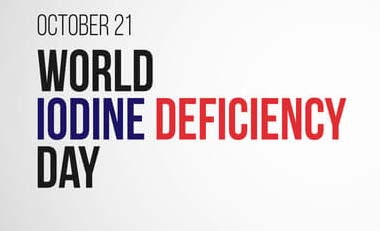Iodine: One of the essential micronutrients in our daily diet
Posted on: 20/Oct/2020 9:52:45 PM

This World Iodine Deficiency day, that is celebrated every year on 21st October, It is crucial to take a look at the importance of Iodine which is one of the most essential micronutrients in our daily diet. Micronutrients are crucial for every child�s growth and development. Nutritional deficiencies, especially due to a lack of Iodine intake from the diets among infants and growing children have always been a concern globally. These nutrients are important for the child�s cognitive and physical development. The nutrients a child receives in the early years is said to influence their brain development for life.
The iodine intake in the desired quantities is vital for healthy mental development of children up to the age of 5 years old1. Children in this age group are known to be more curious, ask a lot of questions and are eager to discover newer things. So, it becomes important for parents to encourage this inquisitiveness and answer their questions in the right manner while also ensuring that the child gets adequate amount of iodine through their daily diet. A UNICEF report2 states that the first 1,000 days of life, or the time between conception and the age of two years is the period when the foundations of optimum health, growth, and development of brain and nervous system of the child�s life are laid.
Sharing tips on some iodine-rich dietary practices that one can follow to avoid the consequences, Kavita Devgan, Nutrition Expert, Tata Nutrikorner, explained, �Some of the sources of dietary iodine are seafood, eggs and dairy products. However, iodized table salt, is the easiest source of iodine and suitable to everyone. The adequate intake of iodine helps in proper mental development of children and keeps them sharp. The simplest way to ensure that every child, including picky eaters or those who are allergic to certain foods, consumes iodine is by adding iodized salt as an integral part of their diet.�
Micronutrient deficiencies4, i.e. deficiencies of iodine, iron, folic acid, vitamin A and zinc, also cause �hidden hunger� and is a global public health problem, specifically in developing countries like India.
Most countries are at an inherent risk of iodine deficiency because the mineral is unevenly distributed in soil and the environment. In many regions, the soil is becoming increasingly depleted of iodine and consequently in the food derived from it. The geographical characteristics of a country determine how much iodine makes it into the food chain. To overcome this and ensure that populations at large are protected from iodine deficiency, the simple act of iodizing food grade salt that is, adding iodine to salt (universal salt iodization) was implemented in India.
It is vital to monitor that a child is getting enough iodine through their food. It is important that parents discuss their child�s iodine intake with their doctor and pediatrician, and ensure that the child doesn�t develop any conditions due to deficiencies.
Post your requirement - We will connect with the right vendor or service provider








